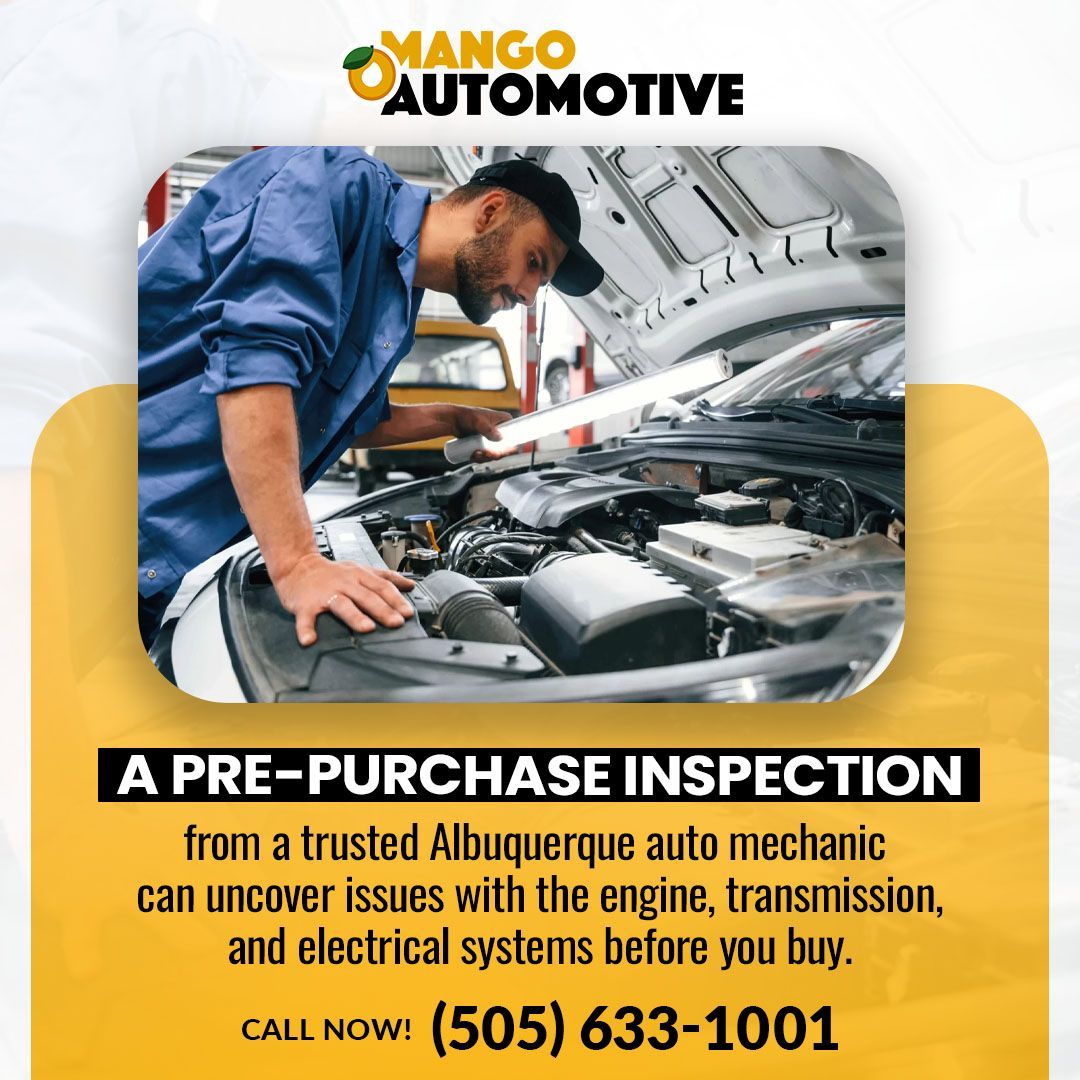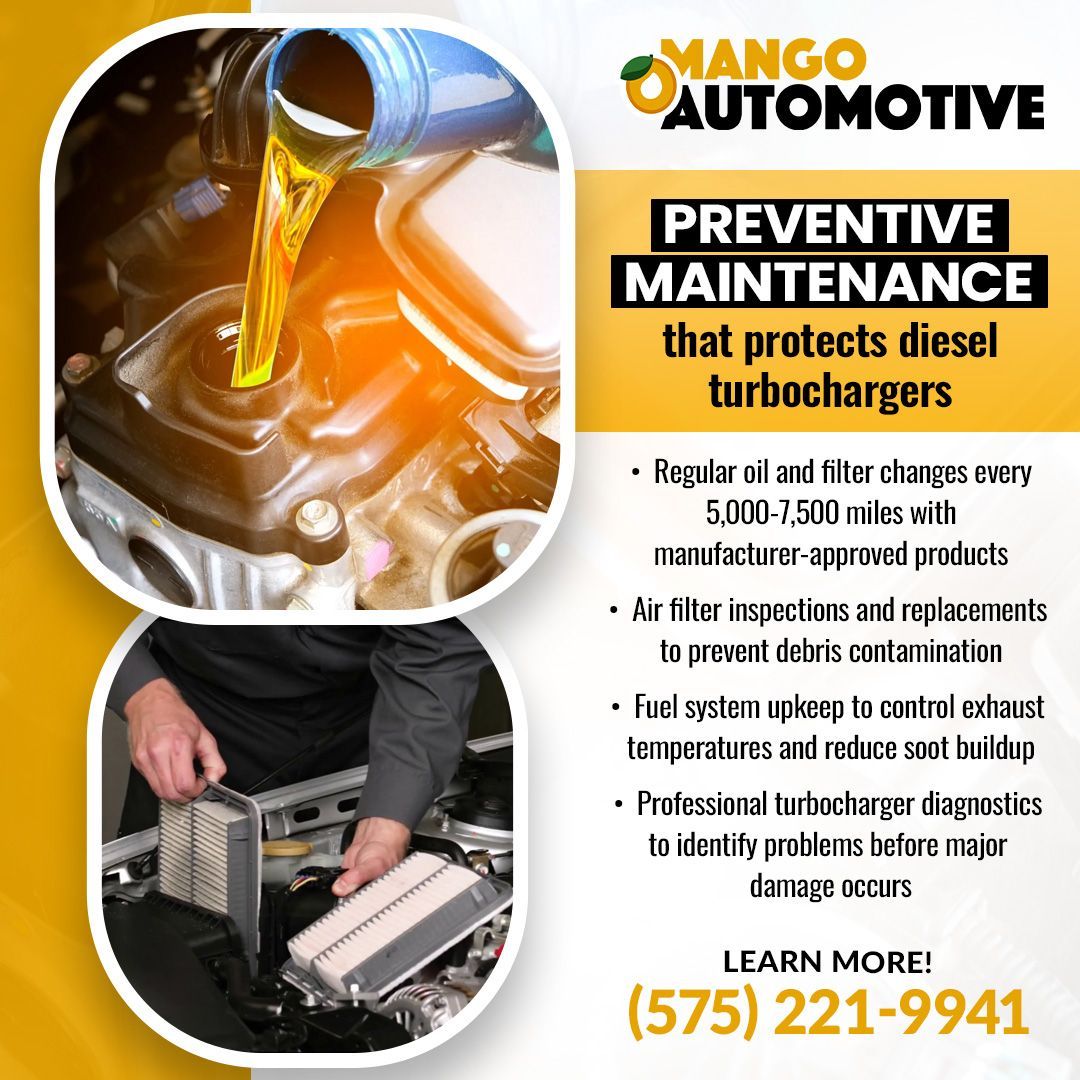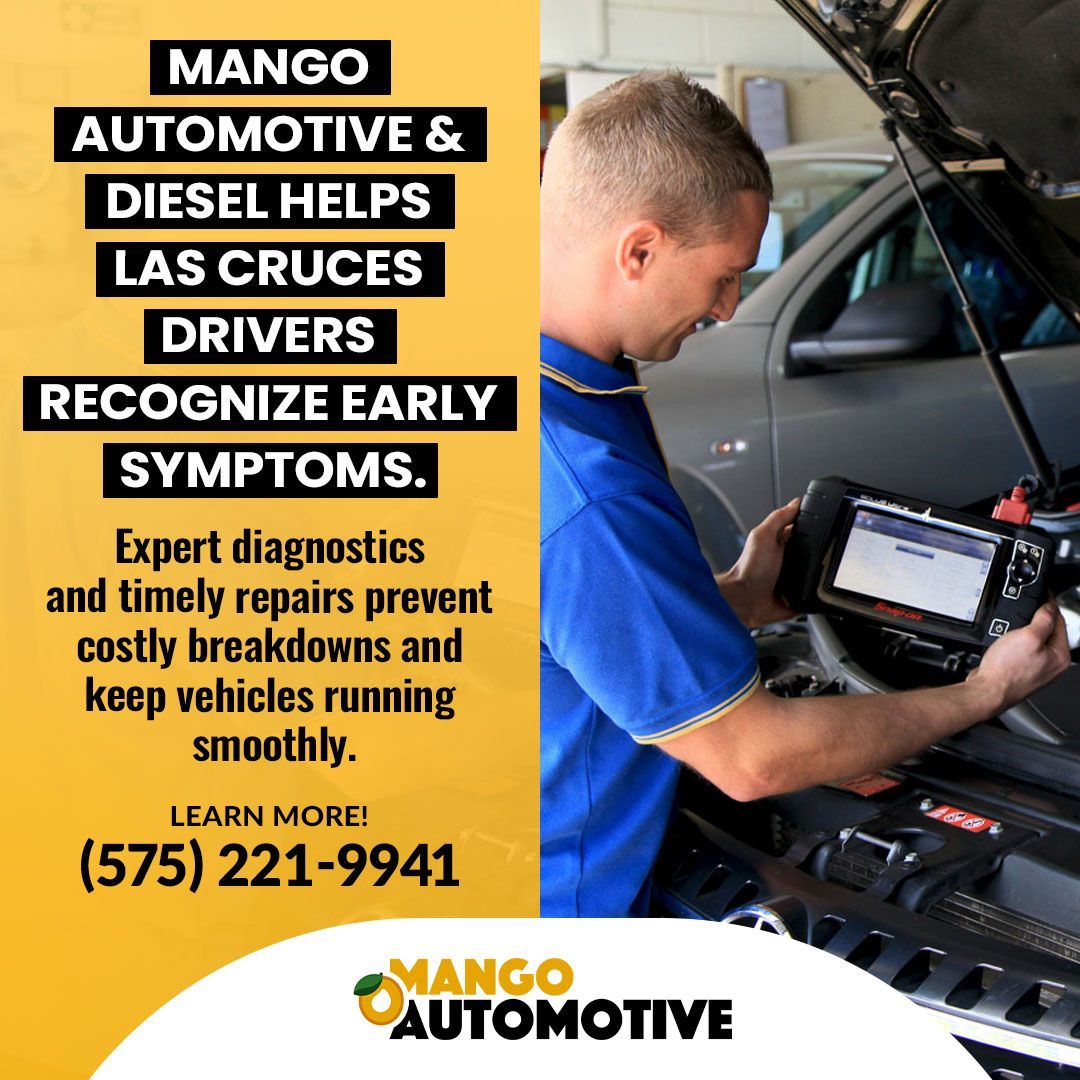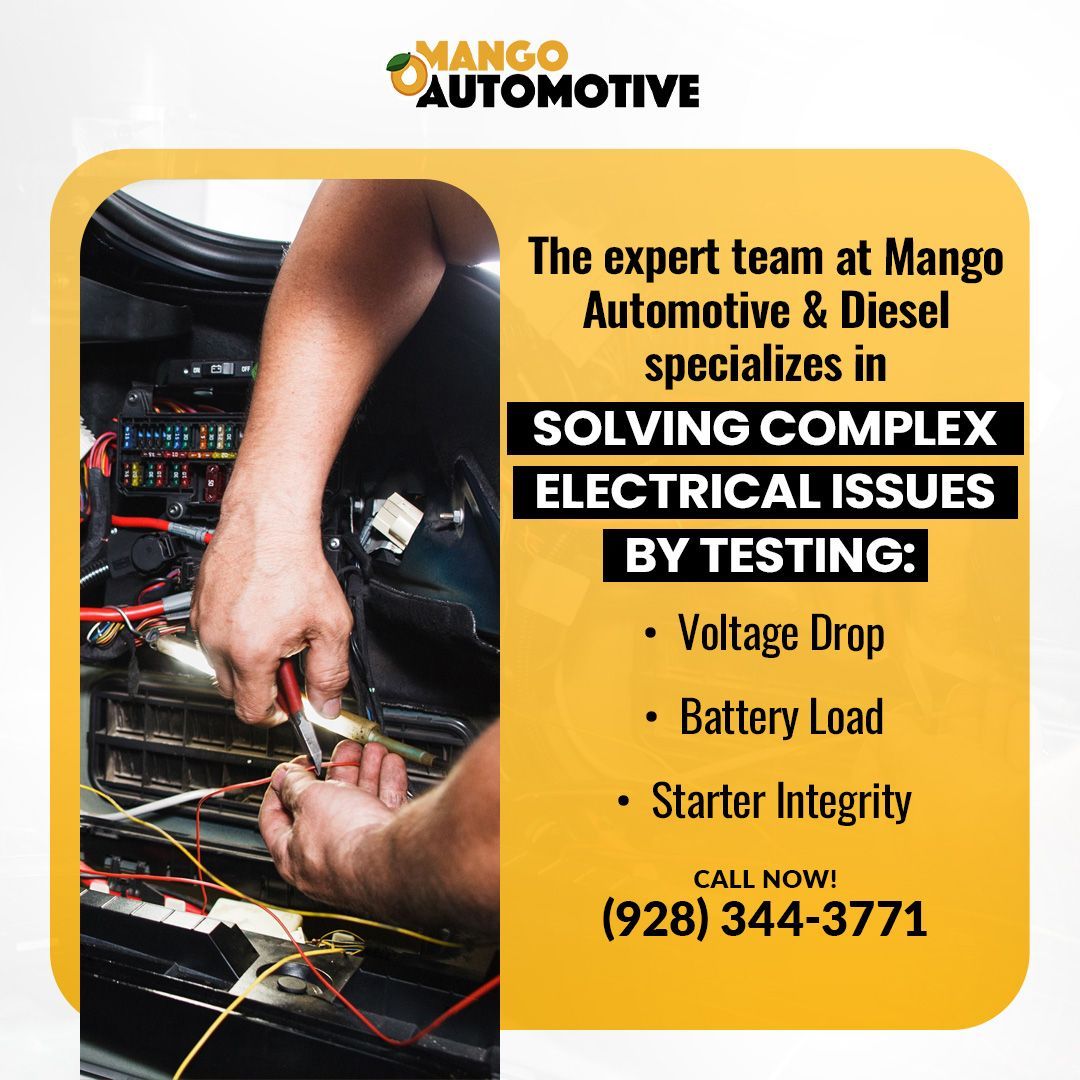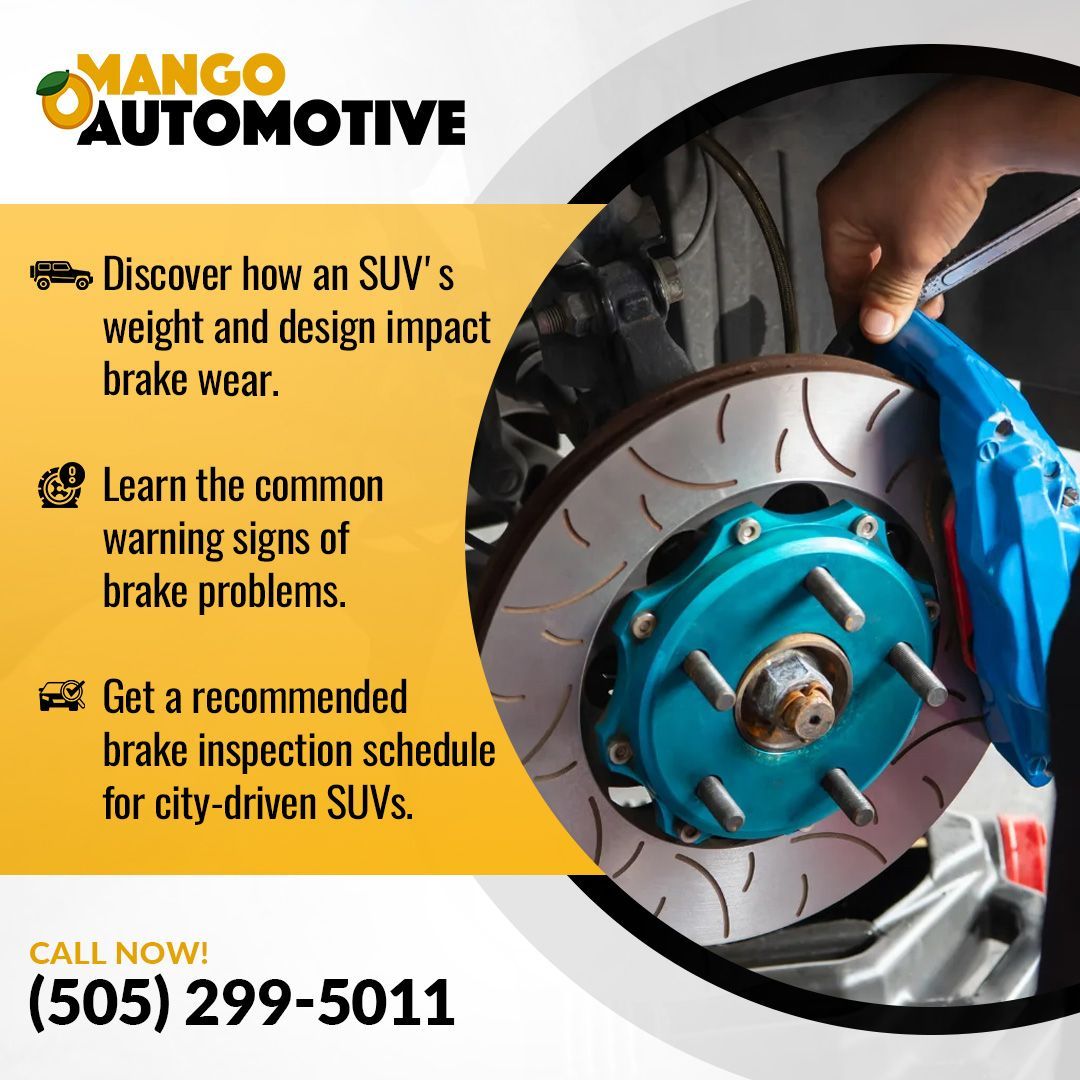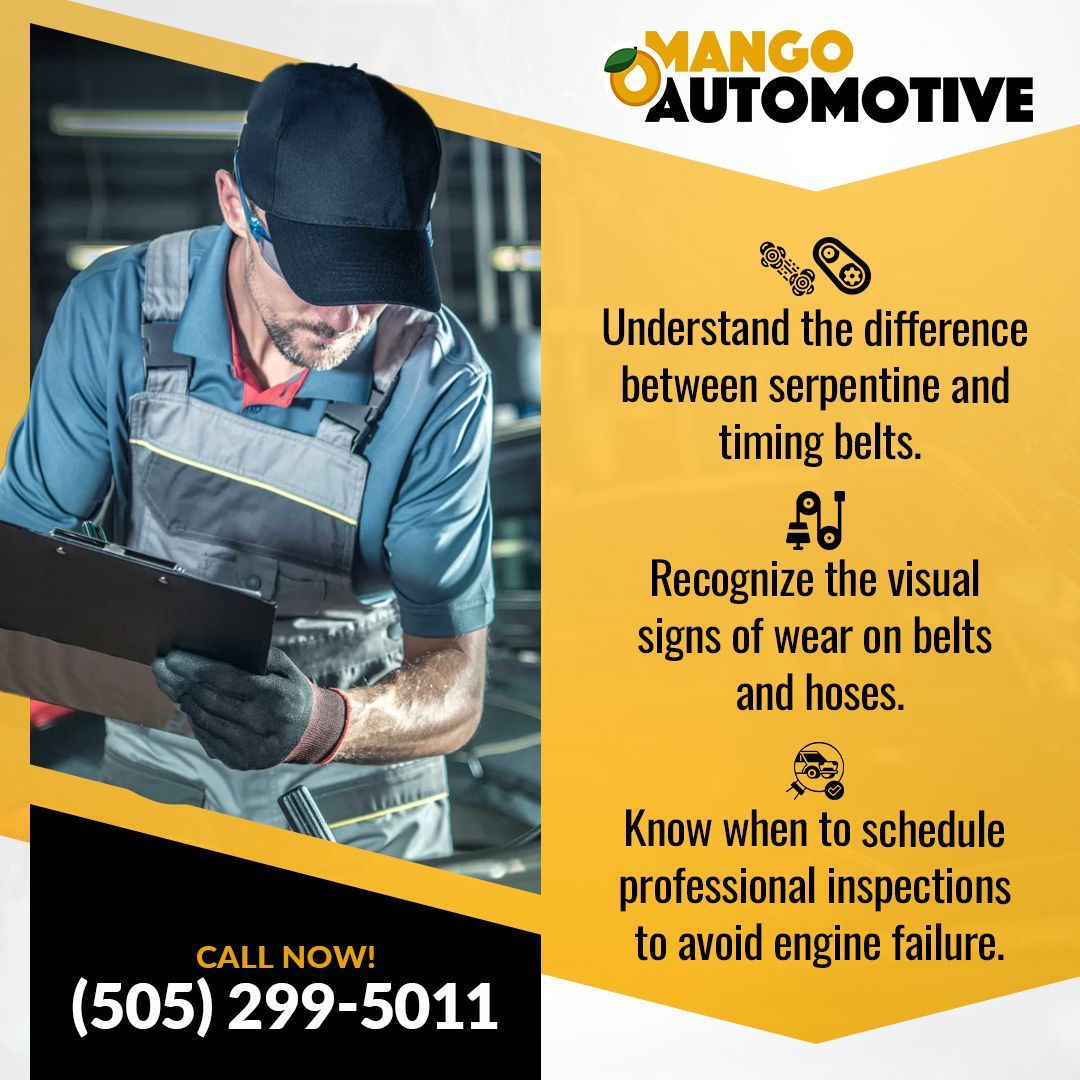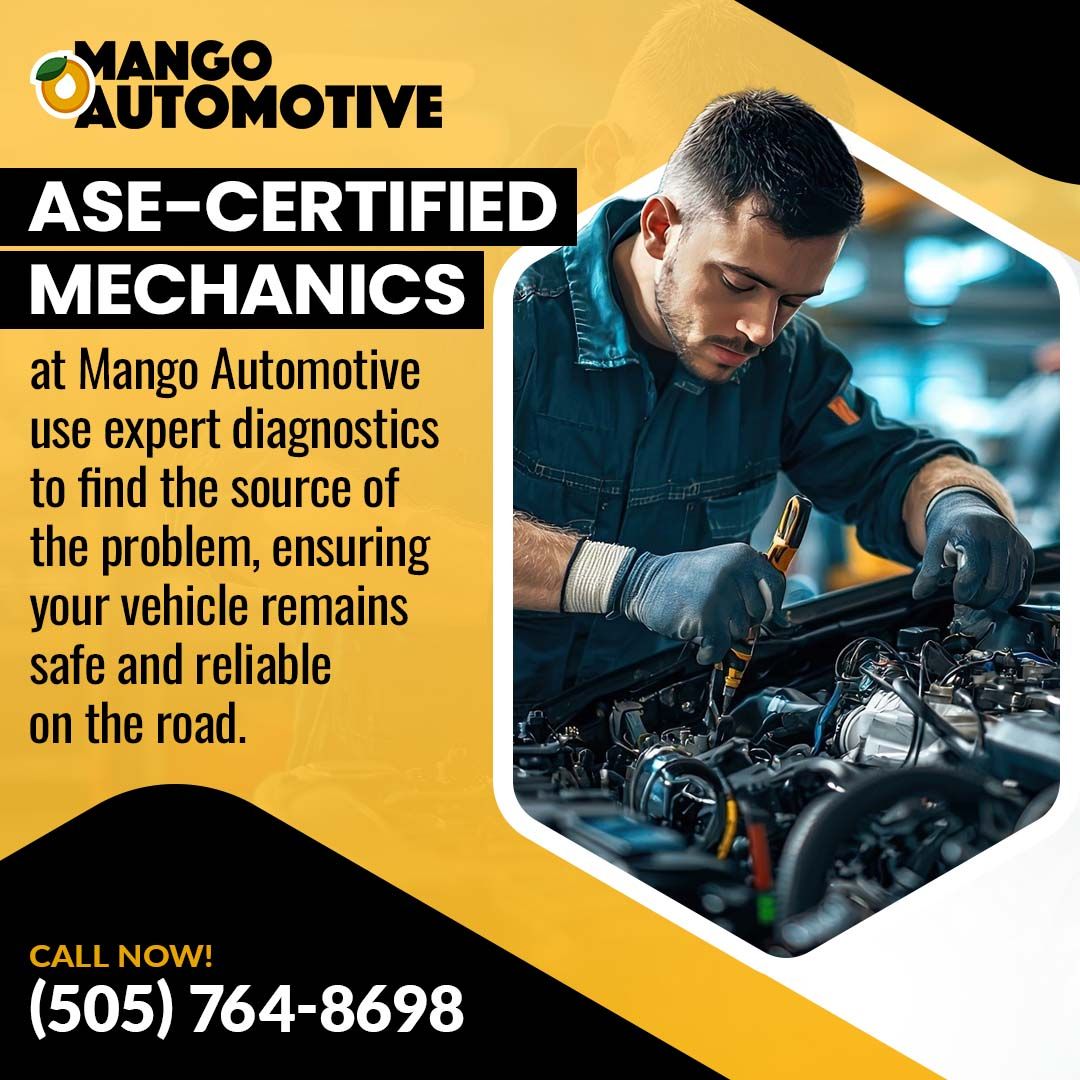A Local Guide to Hybrid Car Maintenance in Albuquerque by Mango Automotive
Hybrid vehicles are often viewed as low-maintenance alternatives to traditional gas-powered cars. However, they still require routine inspections, scheduled part replacements, and specialized attention, especially when exposed to Albuquerque driving conditions that include stop-and-go traffic, steep elevation changes, and extended highway use. Delaying service can lead to performance issues, unexpected breakdowns, and increased repair costs over time.
Many hybrid drivers struggle to find qualified
auto mechanics in Albuquerque with hands-on experience in hybrid system diagnostics and repairs. General service shops may lack the tools or training to accurately handle high-voltage systems or to recognize early signs of wear specific to hybrid designs. This creates a gap between what local vehicle owners need and the type of care typically available. At
Mango Automotive, our team has a deep understanding of hybrid technology and the specific needs of local drivers. Our goal is to help hybrid owners keep their vehicles running efficiently, with maintenance that’s suited to both the car and the environment it operates in.
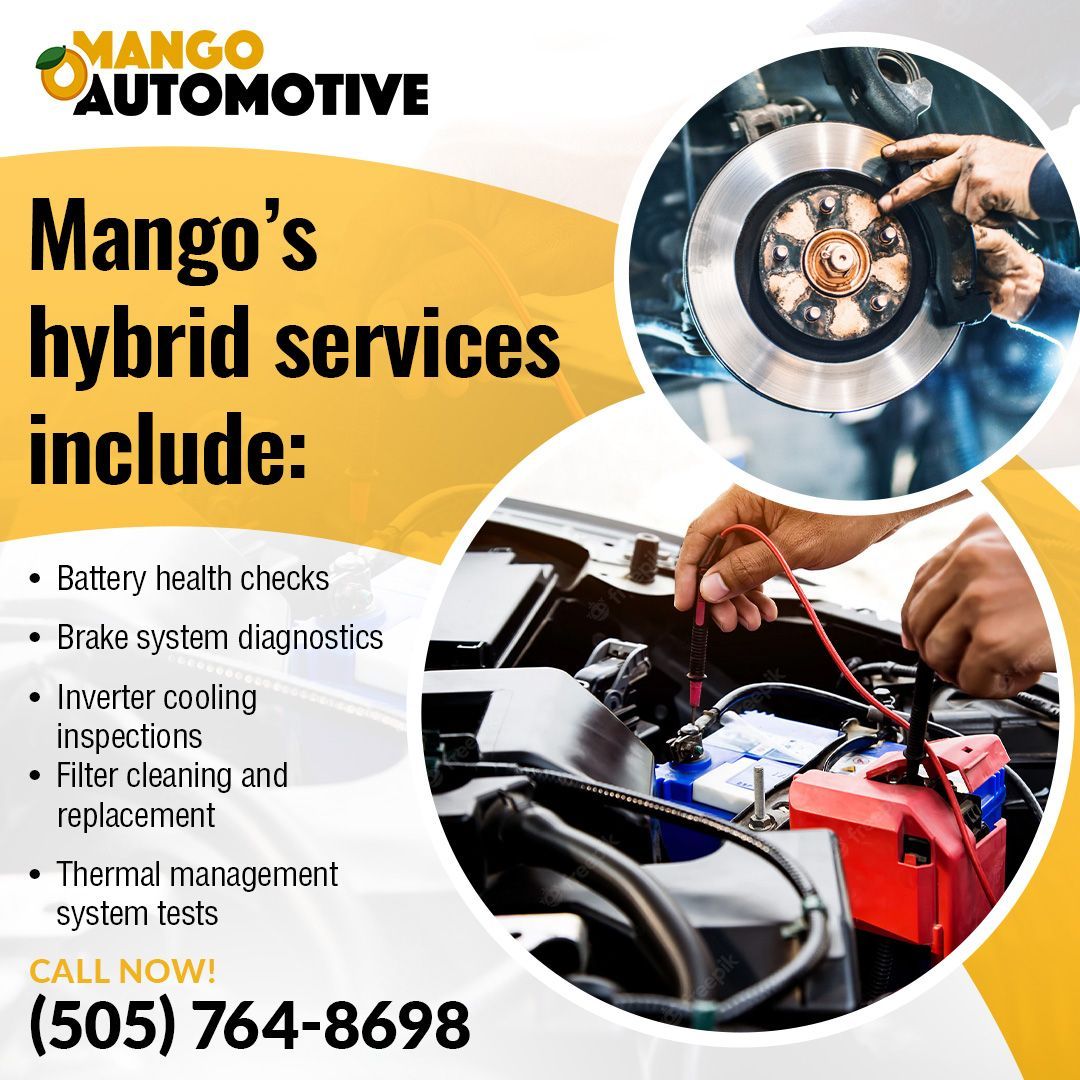
What Makes Hybrid Vehicles Different from Gas-Only Cars
Hybrid vehicles combine a gasoline engine with an electric motor to reduce fuel use and emissions. Unlike conventional cars, hybrids use a battery-powered electric motor alongside the engine. This dual system allows hybrids to switch between or combine power sources depending on speed, load, and driving conditions.
For example, a hybrid may rely solely on its electric motor at low speeds, such as driving through Downtown Albuquerque, and shift to gasoline power during highway acceleration. This technology improves fuel economy and reduces wear on engine parts.
Hybrids also capture energy through
regenerative braking, which converts braking force into electricity to recharge the battery. This feature is not found in gas-only cars and plays an important role in improving their efficiency.
Dual Power Systems: Gasoline and Electric Working Together
The gasoline engine runs when extra power is needed or when the battery runs low. The electric motor provides support during acceleration, low-speed driving, or when idling. This setup leads to fewer trips to the pump and less strain on the engine in stop-and-go traffic.
The hybrid vehicle battery is charged through regenerative braking and, when needed, by the engine. Plug-in hybrids allow charging through an external power source. This reduces reliance on gasoline and gives drivers more flexibility.
Common Components Found in Hybrid Systems
Key hybrid components include a high-voltage battery, electric motor, inverter, and regenerative braking system. Each of these parts plays a role in improving efficiency and cutting fuel use.
High-voltage battery:
Stores electrical energy needed to power the electric motor and support vehicle operation. It needs cooling and monitoring, especially in hot environments like Albuquerque.
Electric motor/generator:
Powers the wheels and recovers energy during braking to recharge the battery.
Power inverter: Converts DC battery power to AC for the motor.
Regenerative brakes:
Turn kinetic energy from braking into electricity for the battery.
These systems operate under different loads than traditional vehicles and require different service tools and knowledge.
Why Routine Maintenance Matters
Regular maintenance is essential to prevent wear on hybrid components and extend the life of the vehicle. Hybrid systems reduce engine use but don’t eliminate the need for service. Oil changes, brake inspections, cooling system checks, and battery diagnostics are still necessary.
Neglecting routine care can lead to reduced fuel economy, overheating, and battery degradation. In Albuquerque’s climate, battery cooling fans and filters often clog with dust, leading to overheating or failure.
At Mango Automotive, our trained
mechanics in Albuquerque check both the engine and the electrical components. We use diagnostics specific to hybrid systems to catch problems accurately.
Maintenance Needs Unique to Hybrid Vehicles
Hybrids need specialized care due to the combination of electric and gas systems that operate under different conditions. These vehicles face distinct wear patterns and system demands compared to standard gasoline-only models.
High-Voltage Battery and Its Cooling System
Hybrid batteries require regular cooling system checks to prevent overheating and early failure. High-voltage batteries run hotter in summer, especially in Albuquerque, where July temperatures average 92°F. Most hybrid battery packs rely on fans and vent systems that pull in cabin air for cooling. If filters clog with dust or debris, airflow drops, and battery temperatures spike.
A study from the National Renewable Energy Lab shows that
battery capacity can decline when regularly exposed to high ambient heat. This makes temperature management essential for hybrid battery longevity in Albuquerque.
Signs of a Weak or Failing Battery System
Common signs include reduced fuel economy, weak acceleration, and warning lights on the dashboard. Other indicators include a constantly running battery fan, longer engine run times, or sudden drops in battery charge during short trips. These signs often appear before total failure, giving time for service if caught early. Parking in shaded areas and keeping vents clean can reduce heat buildup, but scheduled inspections are key.
If ignored, the cost to replace a hybrid battery can exceed $2,000. Mango Automotive offers hybrid battery health checks for customers in Downtown and across Albuquerque. Our auto mechanics in Albuquerque check battery vent lines, fans, and airflow paths to prevent overheating.
Regenerative Brakes and Fluid Maintenance
Regenerative braking systems need less pad replacement but require regular fluid service and hardware checks. Hybrid cars recover energy through regenerative brakes, which reduces mechanical brake use. However, brake fluid still absorbs moisture over time, and calipers or rotors can seize if not used often, especially in dry climates.
Differences from Traditional Brake Systems and Maintenance Intervals Based on Local Driving Habits
Hybrids rely less on traditional brakes, but low usage can cause parts to corrode or stick. Regenerative braking dominates in areas with frequent stop-and-go traffic. This means pads and rotors last longer, but brake fluid still needs replacement every two years.
Drivers who frequently coast or descend hills benefit more from regenerative systems. However, limited mechanical brake use can cause corrosion. Regular inspections catch these issues before they affect safety.
Engine Oil and Filter Replacement
Hybrid engines may run less often, but still require timely oil and filter changes. Because hybrids start and stop frequently, the oil can degrade faster than in gas-only cars. The engine might not reach full operating temperature during short trips, causing moisture and contaminants to build up.
Hybrid Oil Usage Patterns
Even with lower engine run time, hybrids place unique stress on engine oil. Start-stop cycling creates condensation, fuel dilution, and sludge, especially in cooler morning drives. This makes sticking to a time-based oil change schedule more important than mileage alone. At Mango Automotive, we use manufacturer-recommended oil types that support hybrid start-stop wear and thermal stability.
Why Desert Conditions Call for Shorter Service Cycles
High ambient heat in Albuquerque breaks down engine oil faster and shortens service intervals. Dust and sand also contribute to air filter clogging, which affects combustion quality and increases engine workload. For this reason, hybrid owners in the Southwest often need oil changes every 4,000–5,000 miles, not the 7,500-mile interval seen in milder climates.
We advise customers to inspect oil, coolant, and air filters regularly, especially during peak summer months. Our mechanics in Downtown Albuquerque adjust service intervals based on local driving and weather conditions to prevent long-term engine damage.
How Albuquerque’s Environment Affects Hybrid Car Maintenance
Albuquerque’s dry climate, high elevation, and frequent temperature extremes increase wear on filters, fluids, and cooling systems in hybrid vehicles. Dust, heat, and low humidity all affect how hybrid systems perform and how often they require service. These factors impact cabin air quality, high-voltage battery cooling, and fluid stability.
Dust and Air Filter Wear
Dust buildup reduces airflow and forces systems like AC and battery cooling to work harder. Albuquerque experiences over 100 days per year of strong wind or dry conditions that stir up airborne particles. These particles clog cabin and intake filters faster than in less arid regions. Hybrid drivers should check filters more often than factory intervals suggest and replace them as needed.
Cabin Filter Impact on AC Efficiency
Clogged cabin filters strain the air conditioning system and reduce interior cooling performance. Restricted airflow from a dirty filter lowers cold air output, increases compressor load, and may lead to higher energy drawn from the battery. On hot days, this lowers fuel efficiency and makes cabin cooling inconsistent. At Mango Automotive, we inspect cabin filters during every routine hybrid service, especially during summer.
Battery Ventilation and Filter Obstruction Risks
Blocked battery vents restrict cooling and increase the risk of battery overheating or early failure. Many hybrid battery systems rely on cabin air pulled through intake vents located near the rear seat or cargo area. Dust, hair, or debris from passengers and pets can block these vents or the intake filter.
Over time, this can lead to increased battery temperatures and poor performance. Cleaning these filters maintains safe battery operation and extends system life.
High Temperatures and Fluid Breakdown
Heat accelerates the breakdown of engine oil, brake fluid, and coolant. With Albuquerque’s summer temperatures reaching over 90°F, pavement temperatures can climb much higher. Hybrid components exposed to this heat wear faster and require more frequent fluid checks.
Coolant Degradation Under Heat
Coolant loses effectiveness faster in high heat, reducing engine and battery cooling performance. Coolant must stay thermally stable to protect both internal combustion and electric components. In desert heat, coolant degrades more rapidly, which raises the risk of overheating, especially in hybrids using electric water pumps. Manufacturers often recommend coolant service every 5 years, but local conditions may shorten this interval.
Brake Fluid Vaporization and Performance Decline
Brake fluid absorbs moisture and can vaporize under heat, reducing braking effectiveness. Most brake fluids are hygroscopic. They naturally absorb water from the air. As the moisture content rises, the fluid’s boiling point decreases. In high heat, this makes the fluid more likely to boil under pressure. Boiling brake fluid can create air pockets in the brake lines, leading to spongy brakes or brake fade. This is why regular brake fluid checks and timely replacement are important in hot climates.
Hybrid vehicles may use brakes less often, but the fluid still ages and absorbs water. Our mechanics in Downtown Albuquerque suggest a full brake fluid flush every two years to maintain safe performance under high heat.
Warning Signs That Require Attention from a Hybrid-Skilled Mechanic
Hybrid vehicles can develop electrical or mechanical issues that may not be obvious without proper diagnostic tools. Unexplained fuel economy changes, alert lights, or strange noises can point to problems that require a mechanic trained specifically in hybrid systems. General auto mechanics in Albuquerque may not have the equipment or experience to handle these issues safely or correctly.
Electrical System Alerts and Dashboard Indicators
Dashboard lights related to the hybrid system, battery, or charging process should not be ignored. If you see warning lights such as “Check Hybrid System,” “Battery,” or “Ready” not displaying properly, the vehicle may be in a limited power mode. These alerts often relate to high-voltage systems that can’t be tested with standard OBD scanners.
At Mango Automotive, we use hybrid-specific scan tools to identify issues in electric drive modules, inverter systems, and onboard chargers.
Reduced Fuel Efficiency Without Explanation
A sudden drop in MPG often indicates battery or hybrid drive system issues. If your hybrid vehicle starts using more fuel with no changes in driving habits or route, it could point to battery degradation, failing sensors, or reduced regenerative braking. These systems all work together to conserve fuel, and failure in one can affect the rest.
For example, a weak hybrid battery may shift more load onto the gas engine, increasing fuel use. A malfunctioning oxygen sensor could also reduce fuel economy by disrupting the engine’s air-fuel ratio. Hybrid-specific diagnostics by qualified mechanics in Albuquerque are needed to isolate the root cause.
Unusual Sounds from Battery Cooling Fans
Loud or constant fan noise often signals restricted airflow or an overheating battery. High-voltage battery packs use electric cooling fans to maintain temperature during charging and driving. If those fans run longer than usual or make grinding or buzzing sounds, the cooling path may be blocked, or the fan motor could fail. At Mango Automotive, we inspect intake paths and clean or replace filters to prevent fan overwork or battery heat stress.
Service Intervals and Preventive Checks for Albuquerque Drivers
Hybrid vehicles in Albuquerque need maintenance plans adapted to local temperatures, terrain, and driving conditions. Routine service at the correct intervals avoids system failures and preserves fuel economy.
General Maintenance Schedule Adapted for Local Conditions
Hybrids should be inspected every 5,000–7,500 miles, with adjustments based on climate and driving habits. In Albuquerque's summer heat and dust, shorter service intervals often make sense, especially for engine oil changes, filter replacements, and battery ventilation checks.
Regular maintenance reduces wear and protects electric drive components from damage caused by overheating or contamination. For example, filters may clog faster on vehicles that idle in city traffic near Downtown, while long-range commuters may see faster battery degradation. Our
mechanics in Downtown Albuquerque adjust maintenance timing based on how and where you drive.
Recommended Inspection Timeline Based on Vehicle Age and Use
Hybrids under five years old typically need fewer system replacements but still require battery and brake checks. Vehicles over 100,000 miles or the past five years may need deeper inspections of the high-voltage battery, inverter coolant, and hybrid drive motor. We recommend this schedule for Albuquerque hybrid drivers:
Every 5,000–7,500 miles: Oil and filter change, tire rotation, visual checks.- Every 15,000–20,000 miles: Brake system flush, air, and cabin filter replacement.
- Every 30,000–50,000 miles: Cooling system inspection, battery fan cleaning, diagnostic scan.
Our auto mechanics in Albuquerque track each vehicle’s history to adjust this schedule precisely.
Seasonal Considerations: Summer vs. Winter Maintenance Priorities
Summer heat raises the risk of fluid breakdown, while winter cold affects tire pressure and battery output. In the summer, we see more cases of overheated batteries, degraded engine coolant, and worn-out AC compressors. Preventive maintenance includes checking the battery fan for dust, topping off coolant, and verifying fluid seals.
In winter, colder temperatures affect auxiliary 12V battery performance and hybrid warm-up cycles. Fuel economy usually dips slightly as the gas engine runs longer. Our shop recommends seasonal checks before both summer and winter to catch issues before they affect performance.
Why Mango Automotive is a Good Fit for Hybrid Vehicle Maintenance in Albuquerque
Mango Automotive offers hybrid-specific service backed by real experience with Albuquerque roads, heat, and driving conditions. Our mechanics in Downtown Albuquerque understand how elevation, traffic, and climate affect hybrid systems. That knowledge shapes every repair and inspection we perform.
Experience with Hybrid Technology and Local Driving Conditions
We work on hybrids every day and know how Albuquerque’s environment changes how these systems age. Our auto mechanics in Albuquerque are familiar with patterns like heat-driven fan clogging or mileage-driven inverter wear.
We’ve seen how local habits impact regenerative braking, battery load, and fuel economy. Our inspection process considers these factors, not just general mileage.
Tools, Training, and Repair Capabilities
We use the correct scan tools, safety procedures, and hybrid-rated equipment for every job. Servicing high-voltage systems requires tools that most general shops don’t carry. Our shop has the equipment to safely work on hybrid drive motors, inverters, and battery cooling fans. Our mechanics in Albuquerque go through specific hybrid training that covers:
Proper battery disconnection and safety- Diagnostic testing for hybrid control systems
- Maintenance of regenerative brake components
We follow manufacturer specifications and use OEM-grade parts.
Customer Support and Transparent Service Process
We explain problems clearly and never move forward with repairs until the customer understands the issue. From the moment you schedule a maintenance or repair with Mango Automotive, our staff keeps you informed. Digital inspection reports are shared before work begins, and we’re always available to answer questions by phone or text.
We track service history, provide reminders, and adjust future maintenance timing based on your use. Hybrid owners in Albuquerque count on us for honest, local service that’s easy to follow.
Frequently Asked Questions
Do hybrids need less maintenance than regular cars?
No. While hybrids may need fewer oil changes, they have unique systems like high-voltage batteries and regenerative brakes that still require service. Local driving conditions in Albuquerque, such as heat, dust, and stop-and-go traffic, increase wear and tear.
Can any mechanic in Albuquerque work on a hybrid vehicle?
Not always. Many general shops lack the tools and training for high-voltage systems. Certified auto mechanics in Albuquerque, like those at Mango Automotive, use hybrid-specific diagnostics and safety protocols.
What are the common signs my hybrid needs attention?
Dashboard alerts, unusual fan noise, or reduced fuel efficiency. Other signs include longer gas engine run times and weak AC performance. These may point to battery, cooling, or ventilation issues.
Does Albuquerque’s hot weather damage hybrid batteries?
Yes. Studies show prolonged exposure to heat can reduce battery capacity. That’s why Mango Automotive inspects cooling fans, filters, and coolant loops to keep batteries operating efficiently.
Is hybrid brake maintenance different from regular cars?
Yes. Regenerative brakes reduce wear on pads but require fluid checks and flushes. In Albuquerque, brake fluid should be replaced every two years to prevent vaporization and performance decline in hot weather.
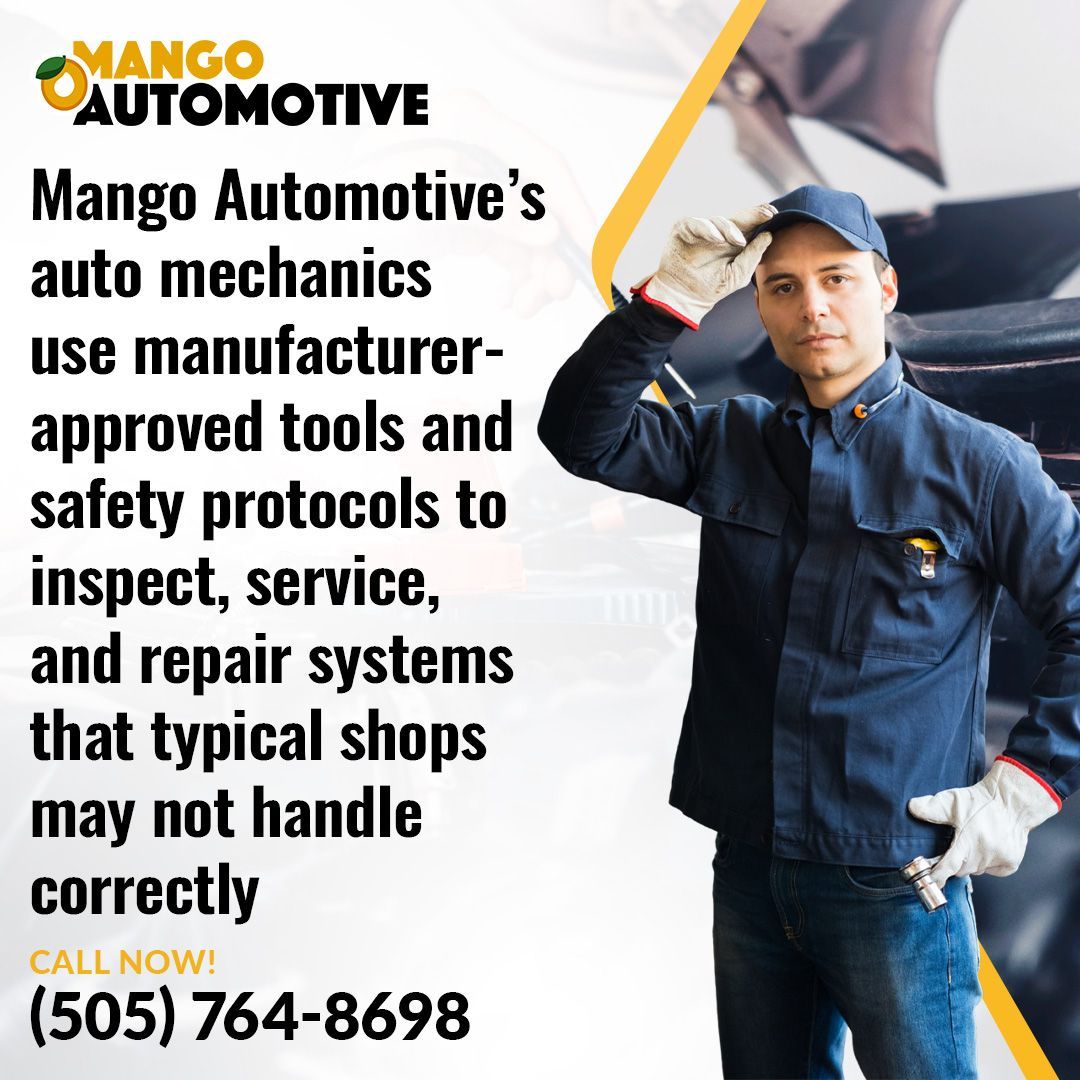
Keep Your Hybrid Vehicle Reliable in Albuquerque’s Climate
Regular hybrid maintenance prevents expensive repairs, especially in Albuquerque’s harsh climate. High temperatures, dust, and stop-and-go traffic can shorten battery life, wear filters faster, and increase fluid breakdown. Local conditions require a more tailored approach to routine service.
At Mango Automotive, we follow manufacturer-recommended service intervals but adjust for Albuquerque’s heat, dust, and driving patterns to keep your hybrid running reliably. Whether you need help with brake service, battery diagnostics, or hybrid-specific fluid checks, our trained mechanics in Albuquerque are ready.
Ready for reliable hybrid vehicle maintenance in Albuquerque? Call Mango Automotive at
(505) 764-8698 to schedule your service. Our experienced mechanics understand hybrid systems and local driving demands, so you get the right care every time.
